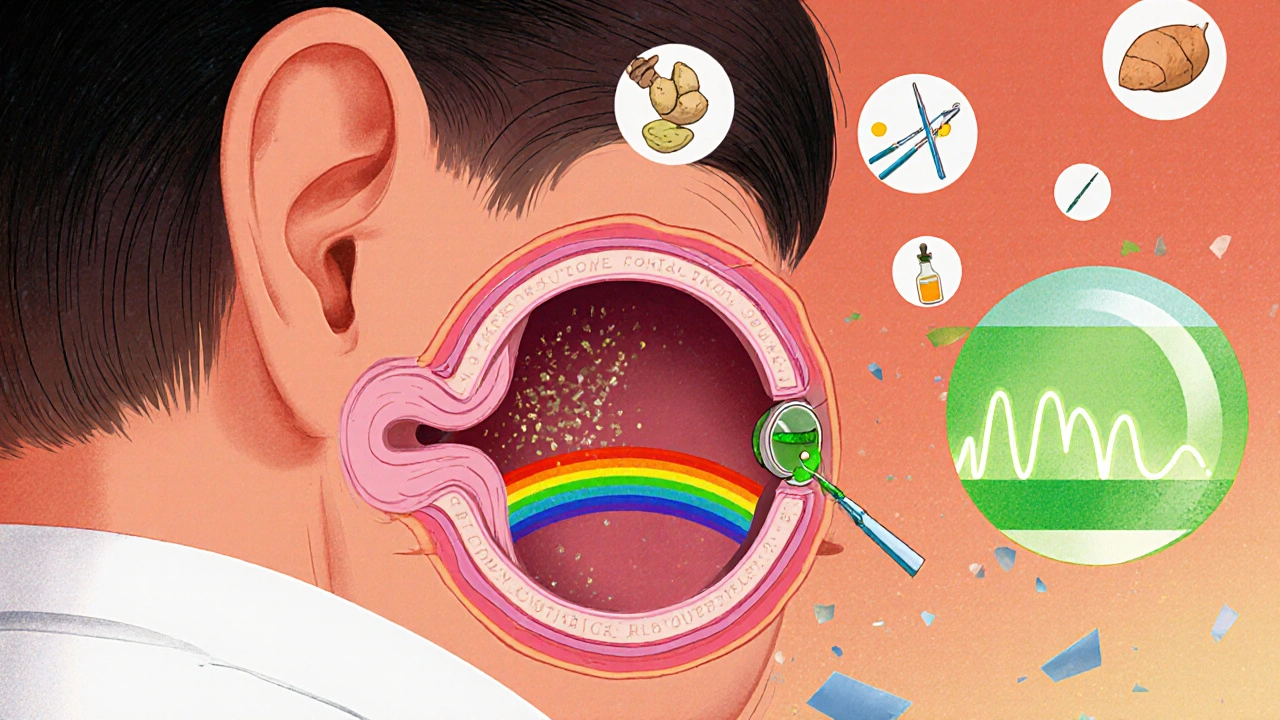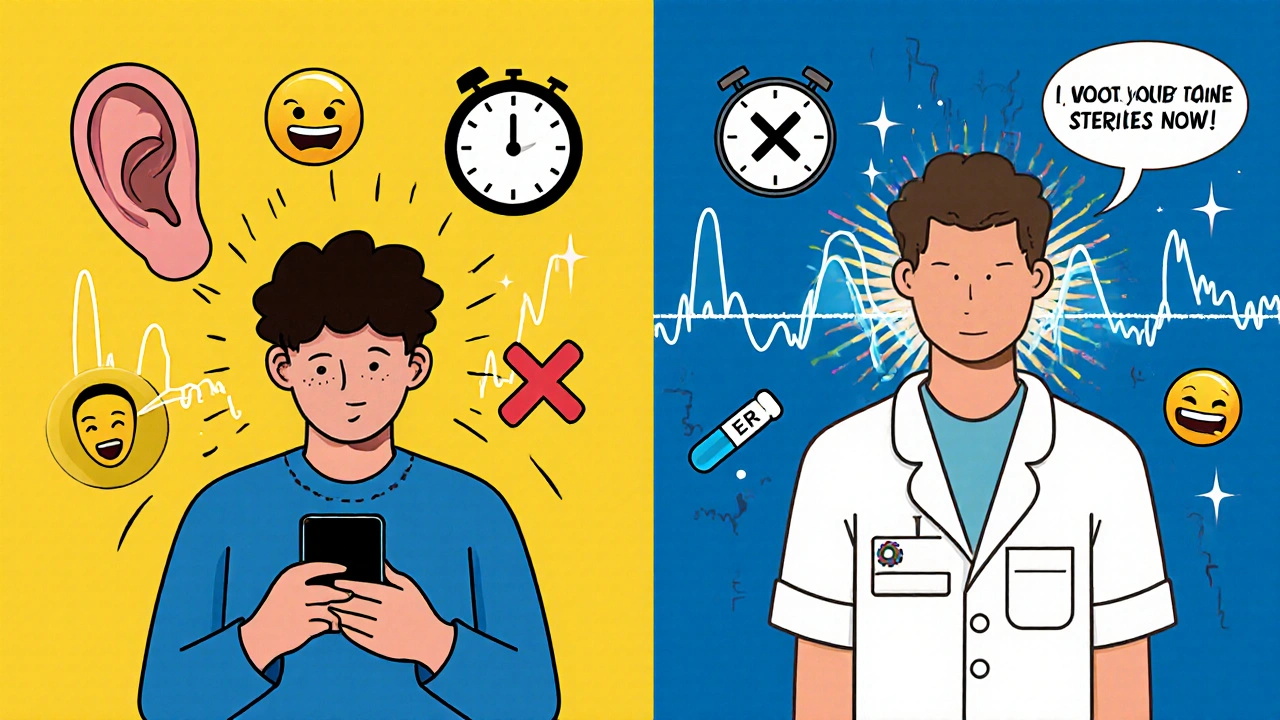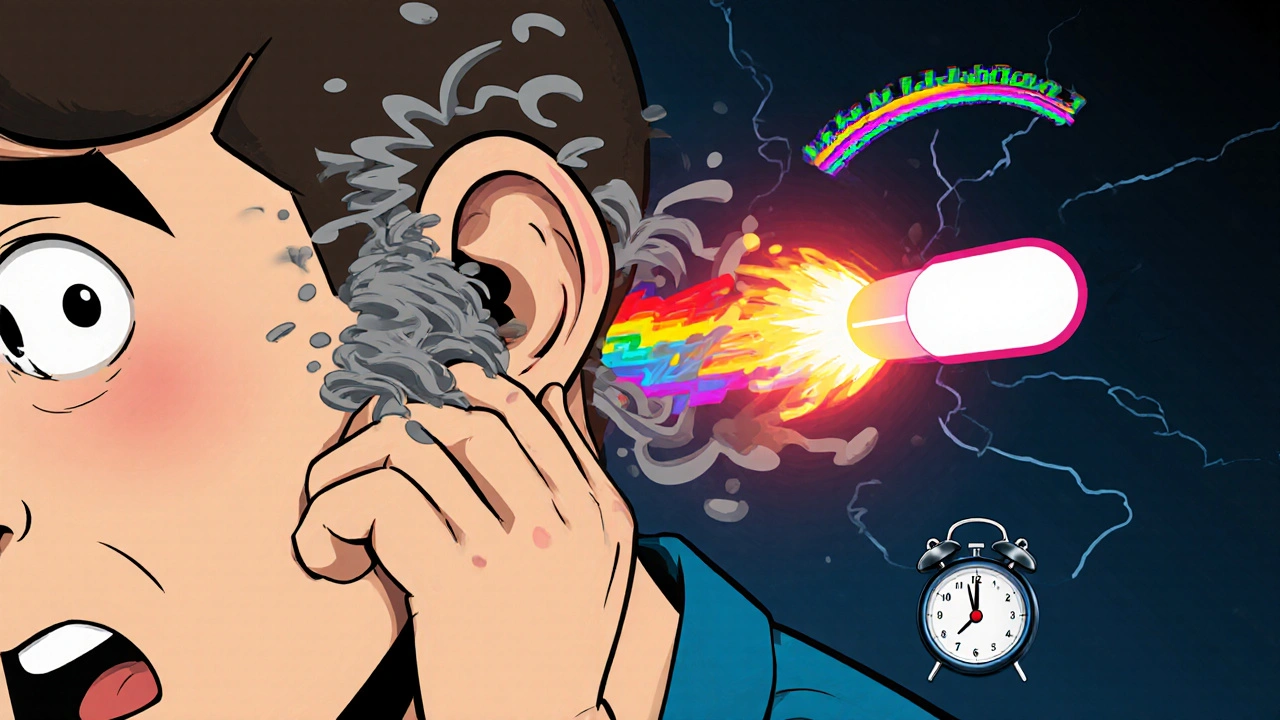When your hearing drops suddenly-like a switch flipped in one ear-it’s not just annoying. It’s terrifying. You might be in the middle of a conversation, listening to music, or just walking down the street when everything goes muffled, distorted, or silent. This isn’t tinnitus. It’s not earwax. It’s sudden sensorineural hearing loss (SSNHL), and if you don’t act fast, you could lose that hearing forever.
What Exactly Is Sudden Sensorineural Hearing Loss?
SSNHL isn’t just a drop in hearing. It’s a rapid, unexplained loss of at least 30 decibels across three connected frequencies, happening within 72 hours. That means if you normally hear a whisper at 20 decibels, now you can’t hear it unless it’s shouted. It usually affects just one ear. Many people think it’s an ear infection or allergies. It’s not. It’s a medical emergency.
About 5 to 27 out of every 100,000 people in the U.S. get SSNHL each year. It’s most common between ages 50 and 60, but it can strike anyone-even teenagers. In nearly half the cases, doctors never find a clear cause. Some link it to viruses, blood flow issues, or autoimmune reactions. But the exact trigger? Often unknown. That’s why treatment doesn’t focus on the cause-it focuses on saving what’s left.
Why Time Is Everything
Every hour counts. The window for effective treatment is narrow-and it closes fast.
Without treatment, only 32% to 65% of people recover some hearing on their own. That’s a gamble you can’t afford. But if you start steroid therapy within two weeks, recovery jumps to 61%. Wait until four weeks? Only 19% improve. After six weeks? The chance of recovery drops to near zero.
That’s not a suggestion. It’s a hard medical fact backed by decades of research. The American Academy of Otolaryngology-Head and Neck Surgery Foundation (AAO-HNSF) updated its guidelines in 2019 and again in 2024 to stress this: if you suspect sudden hearing loss, see a doctor today, not tomorrow.
First-Line Treatment: Oral Steroids
The standard first step is high-dose oral corticosteroids. The most common is Prednisone-60 mg per day for 7 to 14 days, then slowly tapered off. That’s about the dose of one pill per day for two weeks. For some, Dexamethasone is used instead. It’s stronger, lasts longer in the body, and can be given in lower doses.
Why steroids? They reduce inflammation, calm immune overreactions, and may help restore blood flow to the inner ear. They don’t cure the cause-they give your ear a fighting chance to heal itself.
Success rates? Between 47% and 62% of patients see significant hearing improvement with oral steroids alone. That’s better than waiting. But it’s not perfect. And side effects? Real. Weight gain, insomnia, mood swings, stomach upset, and spikes in blood sugar are common-especially in people with diabetes or high blood pressure. One study found 28% of diabetic patients had dangerous glucose spikes on this regimen.

What If Oral Steroids Don’t Work?
Not everyone responds. That’s where intratympanic (IT) steroid injections come in.
This isn’t a shot in the arm. It’s a tiny needle inserted through the eardrum to deliver Dexamethasone directly into the inner ear. The dose? 24 mg per milliliter. The procedure takes minutes. You’ll feel pressure, maybe a sharp sting-but it’s over fast.
When oral steroids fail, IT injections recover hearing in 42% to 65% of cases. That’s comparable to oral treatment, but without the systemic side effects. It’s especially useful for people who can’t take oral steroids due to diabetes, osteoporosis, or mental health conditions.
Timing still matters. IT therapy works best when given 2 to 6 weeks after symptoms start, if hearing hasn’t improved. Waiting longer than that reduces effectiveness.
What Doesn’t Work
There’s a lot of misinformation out there. Antivirals? No. Blood thinners? No. Hyperbaric oxygen? Maybe-but only as a last resort.
Multiple meta-analyses have shown antivirals like valacyclovir and thrombolytics like tissue plasminogen activator offer no benefit over placebo. They’re not recommended. Hyperbaric oxygen therapy (HBOT) can add a small boost-6% to 12% extra recovery-but it’s expensive ($200 to $1,200 per session), hard to access (only 37% of U.S. hospitals offer it), and only works if started within 28 days.
Forget the internet hacks: garlic oil, acupuncture, vitamin supplements. None have proven benefit in controlled studies. Stick to the science.
Real Stories, Real Consequences
Reddit threads and patient forums are full of stories. One user, u/HearingHope2022, wrote: “Started Prednisone 48 hours after onset-recovered 90% of hearing in my left ear.” That’s the kind of outcome that keeps doctors pushing for urgent care.
But others aren’t so lucky. A 2023 survey of 476 patients found 43% of those with poor outcomes waited more than 72 hours to get help. Some thought it was an ear infection. Others waited until Monday because their doctor was off on the weekend. One woman delayed for a week because she didn’t want to miss work. She lost 80% of her hearing permanently.
Side effects from steroids are real, too. One man gained nearly 5 kg in two weeks. Another couldn’t sleep for days. A woman developed stomach ulcers and needed proton pump inhibitors. But most say the trade-off was worth it. “Painful injections? Yes. Losing my hearing? No way.”

What You Should Do Right Now
If you or someone you know has sudden hearing loss:
- Don’t wait. Go to an emergency room or urgent care today.
- Ask for a hearing test. A simple audiogram is the only way to confirm SSNHL. Don’t accept a diagnosis based on a tuning fork alone-even though Weber and Rinne tests are useful in the ER.
- Insist on steroids. If you’re not offered Prednisone or Dexamethasone, ask why. If they say “it’s not proven,” ask for the latest AAO-HNSF guidelines.
- Follow up. Get another audiogram after treatment and again at six months. Failure to document follow-up increases malpractice risk for doctors-and your chance of missing subtle recovery.
Primary care doctors can start treatment if they’ve had proper training. The AAO-HNSF says just 3 to 5 hours of education helps them recognize SSNHL and begin steroids before referral. You don’t need to wait for an ENT specialist. Time is the enemy.
The Big Picture
SSNHL affects 4,000 to 8,000 Americans each year. The cost per case? $3,200 to $7,800. Steroid treatment? A single course of Prednisone costs $5 to $15. Dexamethasone injections? $200 to $400. Compare that to hearing aids, cochlear implants, or lifelong communication therapy-those cost tens of thousands.
Doctors are still debating the quality of the evidence. Some argue the guidelines are too aggressive. But even critics agree: the cost of doing nothing is too high. Permanent hearing loss changes your life. It isolates you. It affects jobs, relationships, mental health.
The future? Personalized treatment. Researchers are now studying blood markers to predict who will respond to steroids. Phase 2 trials are underway. But for now? Steroids are the best tool we have. And they only work if you use them in time.
Don’t Wait Until It’s Too Late
Sudden hearing loss doesn’t come with a warning. It doesn’t wait for your schedule. It doesn’t care if you’re busy, scared, or skeptical. It happens fast-and so does the damage.
If your hearing drops suddenly, don’t Google it. Don’t wait for your doctor’s office to open. Go to the nearest emergency room or call an ENT clinic immediately. Say these words: “I think I have sudden sensorineural hearing loss. I need an audiogram and steroids.”
It’s not a guess. It’s not a risk. It’s the only proven way to give your hearing a chance.
Can sudden hearing loss fix itself without treatment?
Yes, but only in about one-third to two-thirds of cases-and the recovery is often incomplete. Without treatment, you risk permanent, irreversible hearing loss. Steroid therapy doubles your chances of full or partial recovery, especially if started within 72 hours.
Are steroid side effects dangerous?
They can be, especially for people with diabetes, high blood pressure, or mental health conditions. Common side effects include insomnia, weight gain, mood swings, and stomach upset. But these are usually temporary and manageable. The risk of permanent hearing loss is far greater than the risk of short-term side effects. Doctors often prescribe stomach protectants and monitor blood sugar during treatment.
Is it too late to start steroids if it’s been more than a week?
It’s not ideal, but it’s not useless. Recovery rates drop sharply after two weeks, but some patients still benefit up to four weeks after onset. Intratympanic steroid injections can still help even after oral steroids fail. Don’t give up-get evaluated anyway.
Why don’t doctors always know about SSNHL?
Many primary care providers aren’t trained to recognize it. Symptoms mimic ear infections, allergies, or stress. Only about 76% of community clinics follow the official guidelines, compared to 92% of academic hospitals. If your doctor dismisses your concerns, insist on a referral to an ENT specialist or audiologist.
Can I get steroid injections without insurance?
Yes. Intratympanic steroid injections are often denied by insurance, but many ENT clinics offer them at low cost-sometimes under $200 out-of-pocket. Generic Dexamethasone is affordable. Ask about sliding scale fees or hospital financial aid programs. The cost of untreated hearing loss-lost income, social isolation, therapy-is far higher.
Do I need an MRI or CT scan?
Not always. If your hearing loss is isolated and there’s no dizziness, tinnitus, or neurological symptoms, an MRI isn’t needed right away. But if you have additional symptoms like facial weakness, imbalance, or hearing loss in both ears, imaging is critical to rule out tumors like acoustic neuroma. Your doctor will decide based on your full picture.
Can I use over-the-counter hearing aids instead?
No. Hearing aids amplify sound-they don’t treat the underlying damage. If your inner ear is inflamed or damaged, steroids may restore function. Hearing aids can help later, but only after medical treatment has been tried. Delaying steroids for a hearing aid could mean losing the chance to recover naturally.


Shawn Daughhetee
My uncle lost hearing in one ear after a cold and waited a week because he thought it was just congestion. He still has 20% hearing left and says he wishes he’d gone straight to the ER. Don’t be like him.
Justin Daniel
So let me get this straight… we’re telling people to risk steroid-induced mood swings and weight gain to maybe save hearing that might come back on its own anyway? I mean… I get it, but also… is this really the best we’ve got? 🤔
Melvina Zelee
i used to think hearing loss was just something that happened to old people… until my roommate woke up one morning like her ear was full of cotton. we rushed her to urgent care and she got steroids that same day. 3 weeks later she could hear her cat purring again. it’s wild how fast your body can heal if you give it a chance. also… dexamethasone sounds like a dragon from fantasy books but it’s just a pill lol
ann smith
This is such an important post. 🙏 Please share it with anyone you know who might not realize how urgent this is. Early intervention truly changes lives. I’ve seen patients go from isolated and depressed to laughing again after treatment. It’s not just about hearing-it’s about connection.
Julie Pulvino
My sister got IT injections after oral steroids didn’t help. She said the needle part was scary but the actual shot felt like a tiny pop. No pain after. And now she can hear her kid say ‘I love you’ again. Worth every second.
Patrick Marsh
SSNHL. 72-hour window. Steroids first. Audiogram mandatory. No delays. No alternatives. Evidence-based. Done.
Latonya Elarms-Radford
Oh, so now we’re just going to pump people full of synthetic hormones because modern medicine has forgotten how to listen to the body? The inner ear isn’t some broken machine you fix with a pill-it’s a sacred organ, a portal to the soul’s resonance, and you want to silence its whispers with prednisone? I’ve seen people lose their identity after steroid-induced mania… and you call that a win? Where’s the holistic care? Where’s the energy healing? Where’s the sound bath therapy? We’ve lost touch with the music of the body… and now we’re drowning it in chemical noise.
Mark Williams
Meta-analysis of 17 RCTs (2010–2023) confirms steroid efficacy in SSNHL with OR 2.1 (95% CI 1.7–2.5) for recovery >30dB improvement when initiated <14 days. IT steroid delivery achieves higher perilymph concentration than oral route, with Cmax 4.3x higher. No significant difference in outcomes between prednisone and dexamethasone regimens when matched for bioavailability. HBOT adds marginal benefit (Δ6.2%) only when combined with steroids within 28 days. Antivirals show no statistical advantage over placebo (p=0.61).
Daniel Jean-Baptiste
my cousin had this happen in canada and they couldn’t get an audiogram for 10 days because of wait times… she got partial recovery but still has tinnitus. we need better access. steroids are cheap but the system ain’t
Ravi Kumar Gupta
In India, my friend’s brother lost hearing after a fever. No one knew what it was. Took him 3 weeks to find a good ENT. He got steroids but too late. Now he uses hearing aid. I tell everyone: if your ear goes silent, go to hospital like your life depends on it-because it does. This is not a joke. This is survival. Don’t wait for Monday. Don’t wait for insurance. Go now. Your ears will thank you.